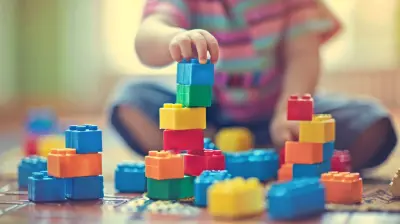4 April 2025
As parents, we all want to raise resilient kids who thrive despite challenges. But in today's world, where instant gratification is the norm, how do we help our children develop grit and perseverance? These qualities aren’t just about pushing through tough times—they shape how our kids face obstacles, grow from failures, and ultimately succeed in life.
So, how do we nurture grit in young children? Let’s break it down. 
What Is Grit and Why Does It Matter?
Grit is the combination of passion and perseverance. It's about having the resilience to keep going despite setbacks. Psychologist Angela Duckworth, who popularized the term, defines grit as the ability to stick with something over the long term, even when things get tough.Why is this important for kids? Because life isn’t always easy. Whether it's struggling with math homework, learning how to ride a bike, or dealing with friendship issues, challenges are inevitable. Kids who develop grit don’t give up easily—they keep trying until they master the skill or overcome the difficulty.
And guess what? Research shows that grit, more than talent or IQ, is a strong predictor of success. So if we want our children to achieve their dreams, helping them develop perseverance is key. 
How to Foster Grit in Your Child
Building grit doesn’t happen overnight. It takes consistent effort and the right parenting approach. Below are some practical ways to encourage perseverance in your little one.
1. Encourage a Growth Mindset
A growth mindset—the belief that abilities can be developed through effort and learning—is a foundation for grit. Children with a fixed mindset believe they are either good or bad at something, leading them to quit when things get hard.How to Foster a Growth Mindset:
- Praise effort, not just the outcome. Instead of saying, “You’re so smart,” try, “I love how hard you worked on that puzzle.”- Teach them that mistakes are learning opportunities. Share your own failures and what you learned from them.
- Use words like "yet." If your child says, "I can't do this," respond with, "You can't do it yet."
When kids understand that effort leads to improvement, they’re more likely to keep going when things get tough.
2. Let Them Struggle (A Little)
As parents, it's hard to watch our kids struggle. Our instinct is to jump in and fix things. But constantly rescuing them can rob them of the chance to build resilience.How to Let Them Struggle Productively:
- Allow them to face small frustrations without immediately stepping in. Let them figure out how to solve a problem before offering help.- Encourage persistence by saying things like, “I know this is hard, but I believe in you.”
- Teach problem-solving skills instead of giving answers. Ask, “What do you think you could try next?”
Giving children the space to struggle teaches them they can handle challenges on their own.
3. Normalize Failure
Failure is an essential part of learning, yet many kids (and adults) fear it. If children see failure as something shameful, they’ll avoid challenges altogether.Ways to Make Failure Less Scary:
- Share your own failures and how you overcame them. Let them see that making mistakes is part of life.- Celebrate effort, even when the outcome isn’t perfect. “You didn’t win the game, but I loved your determination!”
- Encourage risk-taking in safe environments. Let them try new things, even if they might fail.
When kids learn that failure isn’t the end of the world, they'll be more willing to take on challenges.
4. Encourage Passion and Purpose
Grit isn’t just about working hard—it’s also about caring deeply. Kids are more likely to persevere through difficulties when they’re passionate about what they’re doing.How to Help Kids Find Their Passion:
- Expose them to different activities—sports, music, art, science—and see what lights them up.- Encourage them to stick with something for a while before deciding to quit. Grit develops when kids push beyond the initial struggle phase.
- Help them connect their interests to a bigger purpose. If your child loves painting, explain how art can make people happy.
When kids feel a sense of purpose, they’re more motivated to keep going.
5. Model Grit Yourself
Kids learn by watching us. If they see you giving up easily, they’ll likely do the same. But if they witness you tackling challenges with determination, they’ll mimic that behavior.Ways to Model Grit:
- Talk about your challenges and how you push through them. “Work was tough today, but I kept trying and figured it out.”- Show resilience in everyday tasks. If you're cooking and mess up a recipe, say, “Oops! That didn’t work, but I’ll try again.”
- Let them see you working toward long-term goals, whether it’s training for a marathon, learning a new skill, or completing a big project.
When parents demonstrate perseverance, children naturally absorb those lessons.
6. Encourage Healthy Risk-Taking
Taking risks—trying something new, stepping outside of comfort zones—is essential for growth. Kids who never take risks may struggle with resilience later in life.Ways to Encourage Healthy Risks:
- Let them try new experiences, even if they’re nervous. Encourage them to speak in front of a group, try an unfamiliar sport, or tackle a challenging puzzle.- Teach them to assess risks wisely. Instead of saying, “Be careful,” ask, “What’s your plan if this doesn’t work out?”
- Support their independence by letting them make age-appropriate decisions.
Risk-taking builds confidence, and confidence fuels grit.
7. Create a Family Culture of Perseverance
Family values shape how kids view challenges. If perseverance is part of your household culture, your child will grow up believing that persistence is the norm.How to Build This Culture:
- Establish "grit rules" in your home, like “We don’t give up after the first try.”- Read stories about perseverance—books like The Little Engine That Could or Rosie Revere, Engineer.
- Celebrate perseverance milestones. Recognizing their hard work reinforces the value of grit.
When perseverance is recognized and encouraged at home, kids internalize it as a core part of who they are. 
Final Thoughts
Building grit and perseverance in young children takes time, patience, and consistency. It’s about helping them develop a mindset that embraces challenges, learns from failures, and keeps going despite obstacles.Gritty kids become resilient adults. And resilience is what helps them navigate life’s ups and downs with confidence and determination.
So, the next time your child struggles with something, resist the urge to fix it for them. Instead, offer encouragement, teach problem-solving skills, and remind them that effort—not immediate success—is what really matters.
Because in the end, raising kids with grit means preparing them not just for the next test or competition, but for life itself.






Destiny Powell
This article offers valuable insights on fostering grit and perseverance in children. Encouraging resilience through challenges will help them thrive in the face of adversity. Great read!
April 10, 2025 at 3:28 PM